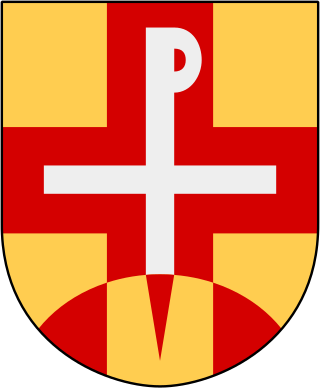
The Lutheran Church—Missouri Synod (LCMS), also known as the Missouri Synod, is a traditional, confessional Lutheran denomination in the United States. With 1.8 million members, it is the second-largest Lutheran body in the United States. The LCMS was organized in 1847 at a meeting in Chicago, Illinois, as the German Evangelical Lutheran Synod of Missouri, Ohio, and Other States, a name which partially reflected the geographic locations of the founding congregations.
The Evangelical Lutheran Church in America (ELCA) is a mainline Protestant Lutheran church headquartered in Chicago, Illinois. The ELCA was officially formed on January 1, 1988, by the merging of three Lutheran church bodies. As of 2021, it has approximately 3.04 million baptized members in 8,724 congregations.

The American Association of Lutheran Churches is an American Lutheran church body. It was formed on November 7, 1987, as a continuation of the American Lutheran Church denomination, the majority of which merged with the Lutheran Church in America and the Association of Evangelical Lutheran Churches to form the Evangelical Lutheran Church in America. The AALC offices were originally in Bloomington, Minnesota. The national office moved to Fort Wayne, Indiana, in 2007. As of 2008, it had 67 congregations, with about 16,000 members. In 2020, the denomination listed 59 congregations. Its current Presiding Pastor is the Rev. Dr. Cary G. Larson.

Concordia Seminary is a Lutheran seminary in Clayton, Missouri. The institution's primary mission is to train pastors, deaconesses, missionaries, chaplains, and church leaders for the Lutheran Church–Missouri Synod (LCMS). Founded in 1839, the seminary initially resided in Perry County, Missouri. In 1849, it was moved to St. Louis, and in 1926, the current campus was built.

Seminex is the widely used abbreviation for Concordia Seminary in Exile, which existed from 1974 to 1987 after a schism in the Lutheran Church–Missouri Synod (LCMS). The seminary in exile was formed due to the ongoing Fundamentalist–Modernist Controversy that was dividing Protestant churches in the United States. At issue were foundational disagreements on the authority of Scripture and the role of Christianity. During the 1960s, many clergy and members of the LCMS grew concerned about the direction of education at their flagship seminary, Concordia Seminary, in St. Louis, Missouri. Professors at Concordia Seminary had, in the 1950s and 1960s, begun to utilize the historical-critical method to analyze the Bible rather than the traditional historical-grammatical method that considered scripture to be the inerrant Word of God.

Confessional Lutheranism is a name used by Lutherans to designate those who believe in the doctrines taught in the Book of Concord of 1580 in their entirety. Confessional Lutherans maintain that faithfulness to the Book of Concord, which is a summary of the teachings found in Scripture, requires attention to how that faith is actually being preached, taught, and put into practice. Confessional Lutherans believe that this is a vital part of their identity as Lutherans.
The Association of Evangelical Lutheran Churches (AELC) was a U.S. church body that existed from 1976 through the end of 1987. The AELC formed when approximately 250 dissident congregations withdrew from the Lutheran Church–Missouri Synod (LCMS) in 1976, and ended as an independent body when it became part of the new Evangelical Lutheran Church in America (ELCA) on January 1, 1988.
The Ceylon Evangelical Lutheran Church (CELC), formerly known as Lanka Lutheran Church, is a Lutheran body in Sri Lanka. It is a denomination of around 5000 members and has been in fellowship with the Lutheran Church–Missouri Synod (LCMS) since 2001. It is a full member of the International Lutheran Council.

Arne Olsson is a Swedish Lutheran bishop. He is the Bishop Ordinary of the Mission Province.

The Mission Province is a Swedish independent ecclesiastical province founded by members of the Church of Sweden who are opposed to the ordination of women to the priesthood and episcopate. The province, which aligns with Confessional Lutheranism, considers itself as a free-standing diocese within the Church of Sweden, a position rejected by the church itself. The Mission Province was founded on 6 September 2003 and shares altar and pulpit fellowship with those in the Communion of Nordic Lutheran Dioceses, in addition to being a member of the International Lutheran Conference.

The Lutheran Churches of the Reformation (LCR) is an association of Lutheran congregations. The LCR has its roots among groups of Lutherans that broke with the Lutheran Church–Missouri Synod (LCMS) in the middle of the 20th century, and was formally incorporated in 1964. Church services are generally traditional and reverent in the style of the mid-1900s conservative Christians.

The Lutheran Church–Missouri Synod (LCMS) operates two seminaries for the formation of its pastors: Concordia Seminary in St. Louis, Missouri, and Concordia Theological Seminary in Fort Wayne, Indiana. Both seminaries grant the Master of Divinity degree which is ordinarily required to be ordained in the LCMS. They also offer a "colloquy" program for pastors who were ordained in other church bodies and want to join the LCMS. Advanced degrees such as Doctor of Philosophy and Master of Sacred Theology are also offered.

The Evangelical Lutheran Church of Latvia is a Lutheran Protestant church in Latvia. Latvia's Lutheran heritage dates back to the Reformation. Both the Nazi and communist regimes persecuted the church harshly before religious freedom returned to Latvia in 1988. In contrast to Estonia, where state atheism reduced the once 80% Lutheran majority to barely 10% by 2011, the Latvian Lutheran church saw its membership drop to around 20% but has recovered and now includes approximately 30% of the population. The church reports having 250,000 members according to the Lutheran World Federation.
Jacob Aall Ottesen Preus II was a Lutheran pastor, professor, author, seminary president and church denominational president. He served as the eighth president of the Lutheran Church–Missouri Synod (LCMS) from 1969 to 1981. He was a major figure in the "Seminex" theological/political controversy, which resulted in a schism in the LCMS during the early 1970s.
Ralph Arthur Bohlmann was the ninth president of the Lutheran Church–Missouri Synod (LCMS), serving four terms from 1981 until 1992. Bohlmann graduated from Concordia Seminary, St. Louis, in 1956 and was ordained on June 29, 1958, in Des Moines, Iowa, by his father, the Rev. Arthur E. Bohlmann. He later received his Ph.D. from Yale University.

Robert David Preus was an American Lutheran pastor, professor, author, and seminary president.

Matthew Carl Harrison is the 13th and current president of the Lutheran Church–Missouri Synod. He was first elected to the presidency on July 13, 2010 at the synod's 64th regular convention in Houston, Texas. Harrison officially took office on September 1, 2010, and was formally installed in a service on September 11, 2010, at Concordia Seminary in St. Louis. He was elected by a 54 - 45% margin on the first ballot. He was elected to a second three-year term following a first ballot victory in the church body's first online presidential election in July 2013. He was elected to a third three-year term in June 2016, having received 56.96 percent of the vote on the first ballot. In June 2019, Harrison was elected to a fourth three-year term with 51.76 percent of the vote on the first ballot.
India Evangelical Lutheran Church (IELC) is a Christian denomination in India. Its headquarters is in Tamil Nadu. It belongs to the International Lutheran Council and the Lutheran World Federation. It has four synods named Ambur Synod, Nagercoil Synod, Kerala Synod and Trivandrum Synod.The India Evangelical Lutheran Church was founded through the missionary efforts of the Lutheran Church–Missouri Synod (LCMS), with whom it remains in altar and pulpit fellowship.
Lutheranism was first introduced to Mexico in the 1850s, when German-American Lutherans began serving German immigrants in Mexico, though mission work among the non-German population in Mexico did not begin until the 1940s. Today there are five Lutheran church bodies in Mexico—the Mexican Lutheran Church, the Lutheran Synod of Mexico, the Confessional Evangelical Lutheran Church—Mexico, the Evangelical Lutheran Church of Mexico (unaffiliated), and the Lutheran Apostolic Alliance of Mexico (unaffiliated)—and several independent congregations.
The Communion of Nordic Lutheran Dioceses are Lutheran dioceses that entered into schism with their Scandinavian national churches in 2003 due to what they perceived as "the secularization of the national/state churches in their respective countries involving matters of both Christian doctrine and ethics". These dioceses are members of the International Lutheran Council, a body of Confessional Lutherans, they are in full communion with one another and include the Evangelical Lutheran Mission Diocese of Finland, Mission Province of the Church of Sweden, and the Evangelical Lutheran Diocese of Norway. These dioceses entered into schism with the Evangelical Lutheran Church of Finland, Church of Sweden, and Church of Norway, respectively, though the Mission Province considers itself to be a non-territorial diocese within the Church of Sweden. Their lines of apostolic succession derive from other traditional Lutheran Churches, such as the Evangelical Lutheran Church in Kenya; Walter Obare Omwanza, presiding bishop of the Evangelical Lutheran Church in Kenya, assisted by bishops Leonid Zviki from Belarus, David Tswaedi from South Africa, Børre Knudsen and Ulf Asp from Norway, consecrated Arne Olsson in apostolic succession as the Ordinary for the Mission Province. The first bishop of the Evangelical Lutheran Mission Diocese of Finland, Risto Soramies, was then ordained by Matti Väisänen of the Mission Province of the Church of Sweden. These dioceses have an Evangelical Catholic churchmanship, reflective of the influence of High Church Lutheranism and Pietist Lutheranism in Scandinavia. As such, the Communion of Nordic Lutheran Dioceses affirms:
We believe, teach and confess that biblical faith and doctrine which is founded on the prophetic and apostolic Scriptures of the New and the Old Testament and which has been expressed in the three main creeds of the Early Church, that is, the Apostolic, the Nicene-Constantinopolitan and the Athanasian Creed, and in the unaltered Augsburg Confession, and that is rightly and bindingly explained by all the books accepted into the Book of Concord of the Lutheran Church.










